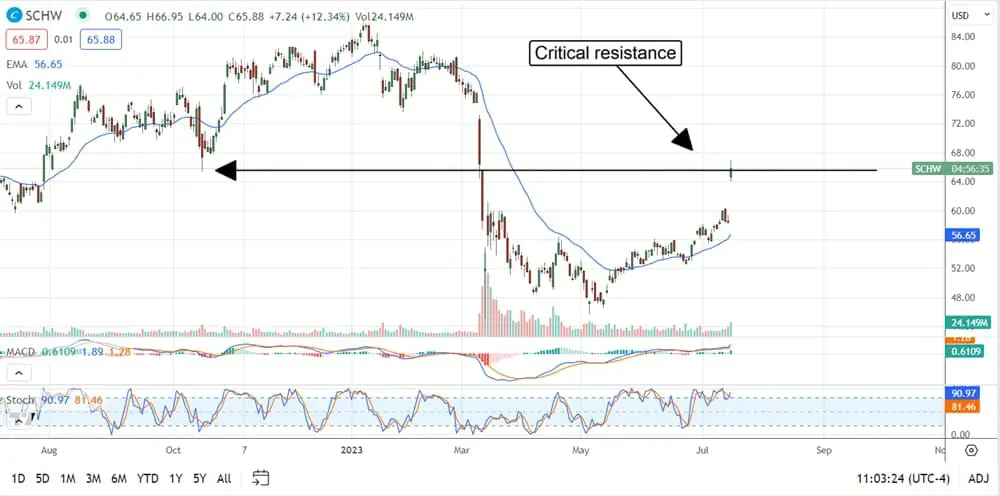Charles Schwab gets the rebound, Time to buy?

Key points
-
Charles Schwab outpaced consensus on the top and bottom lines; shares surged.
-
Analysts support the stock but institutions and insiders may produce a headwind.
-
The dividend is reliable in 2023, and the distribution may grow.
-
5 stocks we like better than Charles Schwab
Charles Schwab Corporation (NYSE:SCHW) shares rebound after several months of weak performance. The fear which drove the market to multi-years was not unfounded, but it was extreme and put the market in deep-value territory. That fact is evidenced by the surge in insider buying immediately after the March decline, a fact the insiders are indeed happy about now.
The point is that Charles Schwab’s business was impacted by the financial crisis that emerged in early 2023 but not as badly as feared, and the company is building leverage for the upswing. Among the takeaways from the Q2 report are that client assets are up, and the number of brokerage accounts is growing, proving the company’s utility to investors.
The bottom line is that Charles Schwab is nearing an inflection point that could return it to growth before the end of the year.
Do you know which under-the-radar stocks the top hedge funds and institutional investors are investing in right now? Click here to find out.
Charles Schwab outperforms in Q2
Charles Schwab had a decent quarter in Q2 despite an expectation for deceleration. The company reported $4.66 billion in net revenue, a decline of 9% compared to last year, but it beat the consensus estimate by 100 basis points. The revenue was driven by a $52 billion gain in core new assets coupled with the addition of 1 million new brokerage accounts. Services also aid the company’s top and bottom lines, with roughly half of all assets receiving aid.
The margin news is equally mixed with margin contracting compared to last year but less than expected. The GAAP pretax margin fell 830 basis points to 36.3%, adjusted by 750 to 42%, to leave the GAAP and adjusted earnings down compared to last year.
The takeaway is that the adjusted $0.75 is $0.04 or 560 bps better than expected, and strength is expected to continue. The company CFO noted that outflows were slowing significantly and that cash held for clients could inflect to growth later this year. That scenario would underpin a return for growth for the company and may lead the analysts to up their targets again.
The analysts’ activity is mixed in 2023, but they support the market. The 17 with current ratings listed on Marketbeat have the stock pegged at Moderate Buy, which has held steady throughout the turmoil in the banking sector.
The consensus price target is near $67, which assumes about 1.5% of the upside for the market. The most recent activity includes 4 updates issued in July, including 1 price target reduction to an above-consensus level, 1 upgrade to Buy, and 2 price target increases that align with the pre-release consensus. The expectation is that analysts will raise their price targets and lead the market to another new high.
The insiders and institutions may produce a headwind
The insiders bought SCHW when the stock price imploded, but they’ve already begun to take profits. The 1st sale to show up is by Chairman Charles R. Schwab, who did not buy on the dip. That sale was in May; more may follow now that price action is increasing.
The pre-collapse activity indeed suggests it might. As for the institutions, they also bought the dip but their activity, which spiked in Q1, fell off sharply in Q2 and turned bearish on balance. Again, with higher share prices, they could sell into the rally and produce a headwind for the market.
The stock price surged more than 12% following the news, but investors should not chase this market higher. The action shows resistance at a critical level that could cap gains for the foreseeable future.
That level is consistent with previous support and resistance that has produced significant moves. If the stock can’t get above that level soon, it may form a consolidation before advancing. If there is no follow-through from the analysts or institutions, the stock may not be able to move higher.
